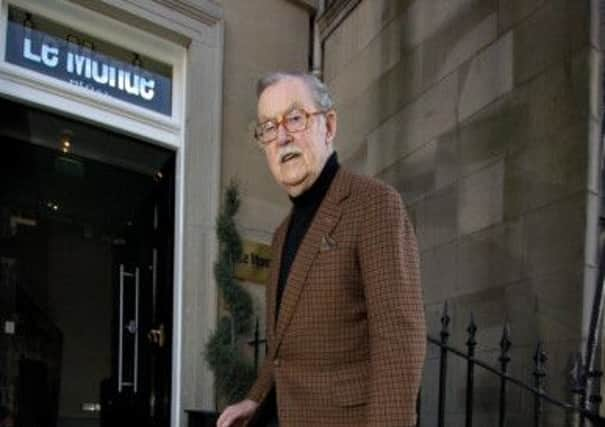Obituary: Alan Whicker, CBE, broadcaster and author


The veteran television broadcaster, Alan Whicker, held a special place in the hearts of viewers for his relaxed reporting, canny ability to make complex political subjects comprehensible and ask the most difficult questions of dictators or plutocrats with an endearing smile. Whicker was a charmer. With his smooth voice, horn-rimmed glasses, sleeked black hair and officer moustache he gave the impression of the English gentleman.
He began his career in Fleet Street but moved to join the BBC’s Tonight magazine programme before fronting his own programme Whicker’s World, which ran from 1959 to 1988 on both the BBC and ITV. Whicker regularly travelled more than 100,000 miles a year interviewing, as he delightfully put it, “the good, the great and the downright strange”.
Advertisement
Hide AdAdvertisement
Hide AdSeveral notable Whicker’s World shows had Scottish connections. He joined Sean Connery on the set of You Only Live Twice in 1967. In 1980 he came to Scotland to do a programme about whisky and enjoyed a guided tour by Raymond Miguel, the boss of Bell’s Whisky.Among his more famous interviewees were John Paul Getty, Baroness Thyssen, Roald Dahl, Papa Doc Duvalier of Haiti and President Marcos of the Philippines.
He was awarded the CBE for services to broadcasting in 2005.
Alan Donald Whicker was born to British parents in Cairo but when he was three his father became ill and Whicker was brought up in Richmond, west London. He attended Haberdashers’ Aske’s Boys School where he was a talented cross-country runner. He left school at 16, was commissioned as an officer in the Devonshire Regiment and joined the Film and Photo Unit.
When it was suggested that he join the unit Whicker replied with typical aplomb: “It sounded like an adventurous suicide – but it was stylish.”
He joined the 8th Army in North Africa and in 1943 landed in Sicily – filming the advance though the south of Italy and US general Mark Clark’s entry into Rome.
It was, however, in the north of Italy where Whicker made a little bit of history. He and his unit got to Milan before the Allied forces (“God knows what they were doing,” he joked).
The city was deserted and while he was taking pictures of the Basilica some partisans informed him that the German troops insisted upon surrendering to an Allied officer.
So Major Whicker put down his camera and confronted the SS officer who said: “My men are at your disposal. I couldn’t surrender to that rabble.”
Advertisement
Hide AdAdvertisement
Hide AdFor good measure they handed over the SS gold reserves and Whicker then filmed the body of Mussolini and his mistress hanging from a lamp-post.
In 2004 Whicker retraced his journey in a fascinating television programme – Whicker’s War – when he visited the houses and families and spoke with much modesty, but with much emotion, of his war experiences.
Whicker returned to journalism and covered the Korean War until 1957 when he joined Tonight – the early evening show hosted by Cliff Michelmore. One of his first assignments was to report on London’s first parking meters. His distinctive style became familiar across the nation. Two years later he left to start Whicker’s World.
He brought to all his documentaries a very personal view and a matchless panache. He did concentrate on hot islands in the Caribbean, luxury hotels and trips on the Orient Express, but at its peak in the 1970s the show had audiences of more than 15 million. Whicker just loved telling stories about the rich at play and he had the ability to gain their confidence.
As he strode around a splendid palace he addressed the viewer personally as if he was only there to ask their questions. In South America, when interviewing a dictator, he refrained from heavy politics but his final sentence to camera spoke volumes of his real opinion.
In 1967 he was the largest investor of the consortium that won the Yorkshire Television franchise. For a few years Whicker confined his programme-making to the company but in he 1982 returned to the BBC where he had a talk show.
His popularity and his quirky personality won him many awards – notably the Richard Dimbleby Award in 1977.
As if to underline his distinctive and idiosyncratic style, he was much mimicked by comedians. The Monty Python team had a sketch with various “Whickers” wandering around some idyllic tropical beach mumbling into microphones. The most successful spoof was Stanley Baxter’s; he got the voice and the facial mannerism just right.
Advertisement
Hide AdAdvertisement
Hide AdWhicker’s success on television and the spin-offs such as books – along with his investment in Yorkshire Television – made him a wealthy man and he had lived in Jersey since the 1970s. He always said his work was his hobby although he also listed “people and reading (usually airline timetables)”.
Whicker was once engaged to Olga Deterding, the oil heiress, but they never married. Since 1969 he lived with his partner, Valerie Kleeman, who is his sole survivor.
ALASDAIR STEVEN